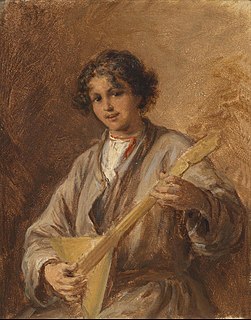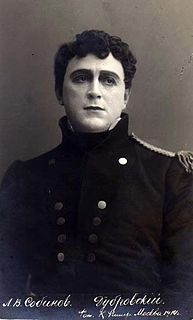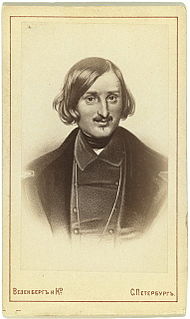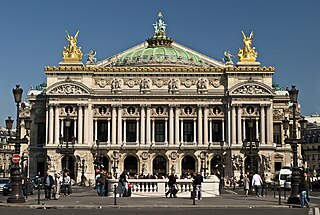
Nikolai Vasilievich Gogol was a Russian dramatist of Ukrainian origin.

The Nose, Op. 15,, is Dmitri Shostakovich's first opera, a satirical work completed in 1928 based on Nikolai Gogol's story of the same name (1836).

The Mariinsky Theatre is a historic theatre of opera and ballet in Saint Petersburg, Russia. Opened in 1860, it became the preeminent music theatre of late 19th-century Russia, where many of the stage masterpieces of Tchaikovsky, Mussorgsky, and Rimsky-Korsakov received their premieres. Through most of the Soviet era, it was known as the Kirov Theatre. Today, the Mariinsky Theatre is home to the Mariinsky Ballet, Mariinsky Opera and Mariinsky Orchestra. Since Yuri Temirkanov's retirement in 1988, the conductor Valery Gergiev has served as the theatre's general director.

Rusalka is an opera in four acts, six tableaux, by Alexander Dargomyzhsky, composed during 1848-1855. The Russian libretto was adapted by the composer from Pushkin's incomplete dramatic poem of the same name. It premiered on 4 May 1856 at the Theatre-circus, conducted by Konstantin Lyadov, choreographed by Marius Petipa and Nikolay Goltz, but was badly received predominantly by the aristocracy.

Russian opera is the art of opera in Russia. Operas by composers of Russian origin, written or staged outside of Russia, also belong to this category, as well as the operas of foreign composers written or intended for the Russian scene. These are not only Russian-language operas. There are examples of Russian operas written in French, English, Italian, Latin, Ancient Greek, Japanese, or the multitude of languages of the nationalities that were part of the Empire and the Soviet Union.

Dubrovsky is an opera in four acts, Op. 58, by Eduard Nápravník, to a Russian libretto by Modest Ilyich Tchaikovsky after the novel of the same title (1832) by Alexander Pushkin.
Evenings on a Farm Near Dikanka is a collection of short stories by Nikolai Gogol, written in 1829–32. They appeared in various magazines and were published in book form when Gogol was twenty-two. The writer was born in the village of Velyki Sorochyntsi near Poltava, and he spent his life in Ukraine up to the age of nineteen. He put his early impressions and memories of childhood into these pictures of peasant life. In a series of letters to his mother, he asked her to write down descriptions of village customs, dress, superstitions, and old stories. These were also used as primary sources.
"Ivan Fyodorovich Shponka and His Aunt" is part of the collection Evenings on a Farm Near Dikanka by Nikolai Gogol.
"The Carriage" is an 1836 short story by Nikolai Gogol, one of his shortest works. The story centers on the life of a former cavalry officer and landowner near a small Russian town. After reading the story, Anton Chekhov wrote to Alexei Suvorin, "What an artist he is! His 'Carriage' alone is worth two hundred thousand rubles. Sheer delight, nothing less."

Vakula the Smith, Op. 14, is an opera in 3 acts, 8 scenes, by Pyotr Ilyich Tchaikovsky. The libretto was written by Yakov Polonsky and is based on Nikolai Gogol's story Christmas Eve. It was written for composer Alexander Serov, who died in 1871 leaving only fragments of an opera on the subject.

This is a list of the works by Nikolai Gogol (1809–52), followed by a list of adaptations of his works:
Shponka and His Aunt is an opera in one act by composer Anastasia Bespalova. The opera uses a Russian libretto by Arkady Zastyrets which is based upon the story of the same name by Nikolai Gogol. The opera was commissioned by the Mariinsky Theatre along with two other new operas, Svetlana Nesterova's The Lawsuit and Vyacheslav Kruglik's The Carriage, all based on stories by Gogol. The three operas premiered together on 21 June 2009 during the Mariinsky Theatre's summer festival.
The Carriage is an opera in one act by composer Vyacheslav Kruglik. The opera uses a Russian libretto by Vera Kupriyanova and the composer which is based upon the story of the same name by Nikolai Gogol. The opera was commissioned by the Mariinsky Theatre along with two other new operas, Svetlana Nesterova's The Lawsuit and Anastasia Bespalova's Shponka and His Aunt, all based on stories by Gogol. The three operas premiered together on 21 June 2009 during the Mariinsky Theatre's summer festival.
Vyacheslav Kruglik is a Russian composer and conductor. He is a member of the orchestral conducting faculty at the Saint Petersburg State University of Culture and Arts.
Anastasiya Bespalova is a Russian composer.

Fyodor Petrovich Komissarzhevsky was a Russian opera singer and teacher of voice and stagecraft. A leading tenor at the Mariinsky Theatre in St. Petersburg, he created many roles in Russian operas, including the Pretender in Mussorgsky's Boris Godunov and the title role in Tchaikovsky's Vakula the Smith. He had a voice described in the Grove Book of Opera Singers as small but with a "velvety timbre" and as a singer was known for not only for his clear diction and beautiful phrasing but also for his skill as an actor. He was the father of the actress Vera Komissarzhevskaya and the director Theodore Komisarjevsky.

The Order of St. Vladimir, Third Class is an unfinished play by Nikolai Gogol, which he worked on between 1832 and 1834.
The Gamblers, Op. 63, is an unfinished opera by Dmitri Shostakovich, to his own libretto based on Nikolai Gogol's comedy The Gamblers (1842). The surviving first act lasts around 47 minutes.
Dead Souls is a 1976 Russian-language opera in three acts by Rodion Shchedrin based on the verse-novel Dead Souls by Gogol, to a libretto by the composer. It was premiered at the Kirov in 1977, and overseas in Boston in 1988.











